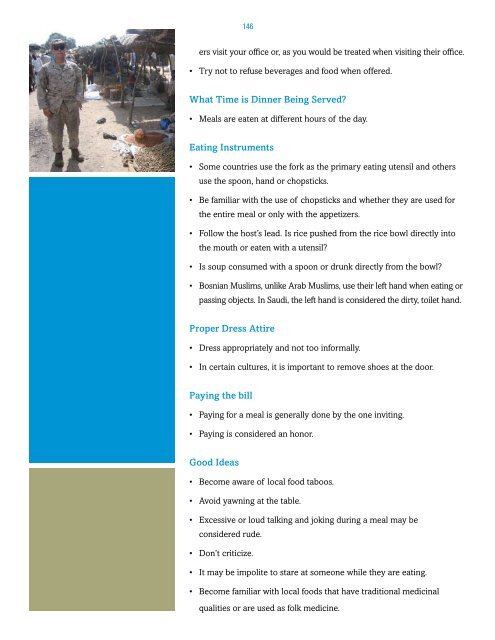special-operations-nutrition-guide
special-operations-nutrition-guide
special-operations-nutrition-guide
Create successful ePaper yourself
Turn your PDF publications into a flip-book with our unique Google optimized e-Paper software.
146<br />
ers visit your office or, as you would be treated when visiting their office.<br />
• Try not to refuse beverages and food when offered.<br />
What Time is Dinner Being Served?<br />
• Meals are eaten at different hours of the day.<br />
Eating Instruments<br />
• Some countries use the fork as the primary eating utensil and others<br />
use the spoon, hand or chopsticks.<br />
• Be familiar with the use of chopsticks and whether they are used for<br />
the entire meal or only with the appetizers.<br />
• Follow the host’s lead. Is rice pushed from the rice bowl directly into<br />
the mouth or eaten with a utensil?<br />
• Is soup consumed with a spoon or drunk directly from the bowl?<br />
• Bosnian Muslims, unlike Arab Muslims, use their left hand when eating or<br />
passing objects. In Saudi, the left hand is considered the dirty, toilet hand.<br />
Proper Dress Attire<br />
• Dress appropriately and not too informally.<br />
• In certain cultures, it is important to remove shoes at the door.<br />
Paying the bill<br />
• Paying for a meal is generally done by the one inviting.<br />
• Paying is considered an honor.<br />
Good Ideas<br />
• Become aware of local food taboos.<br />
• Avoid yawning at the table.<br />
• Excessive or loud talking and joking during a meal may be<br />
considered rude.<br />
• Don’t criticize.<br />
• It may be impolite to stare at someone while they are eating.<br />
• Become familiar with local foods that have traditional medicinal<br />
qualities or are used as folk medicine.


